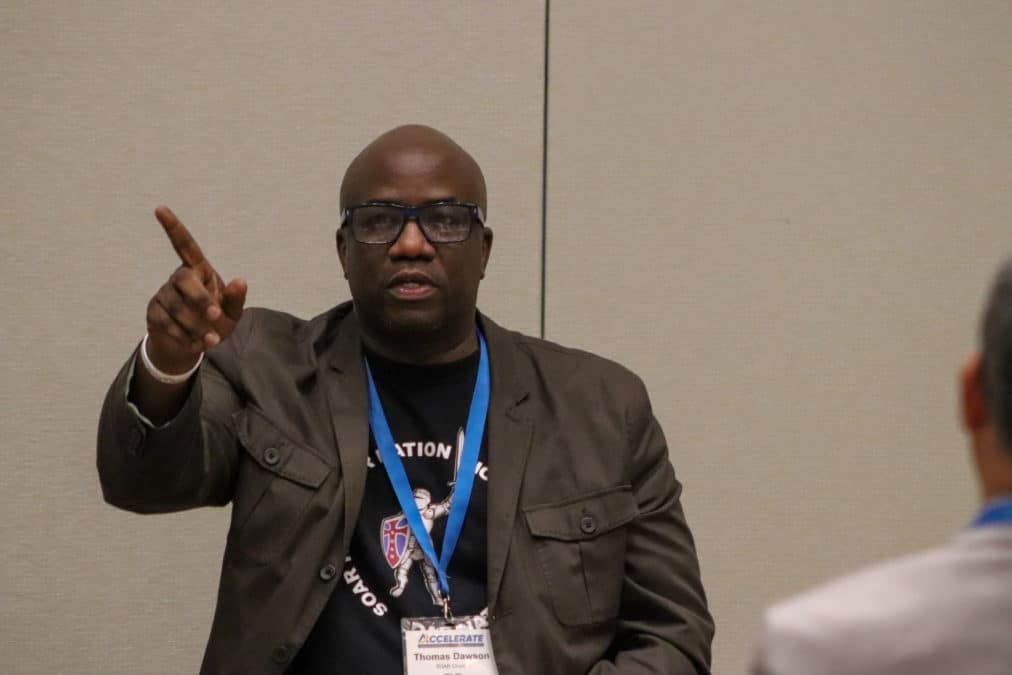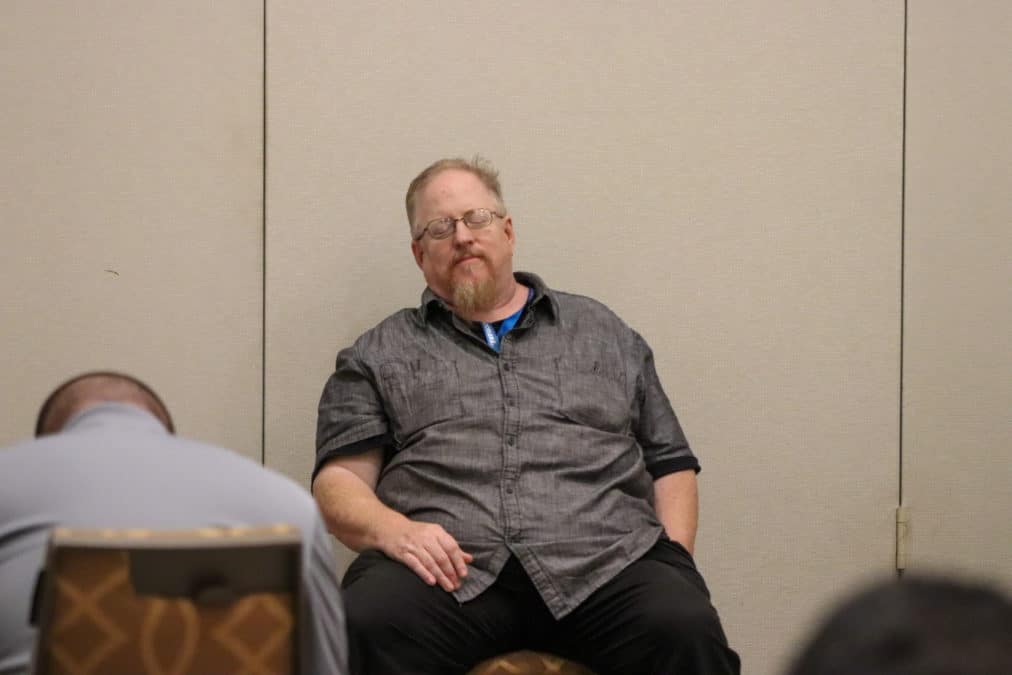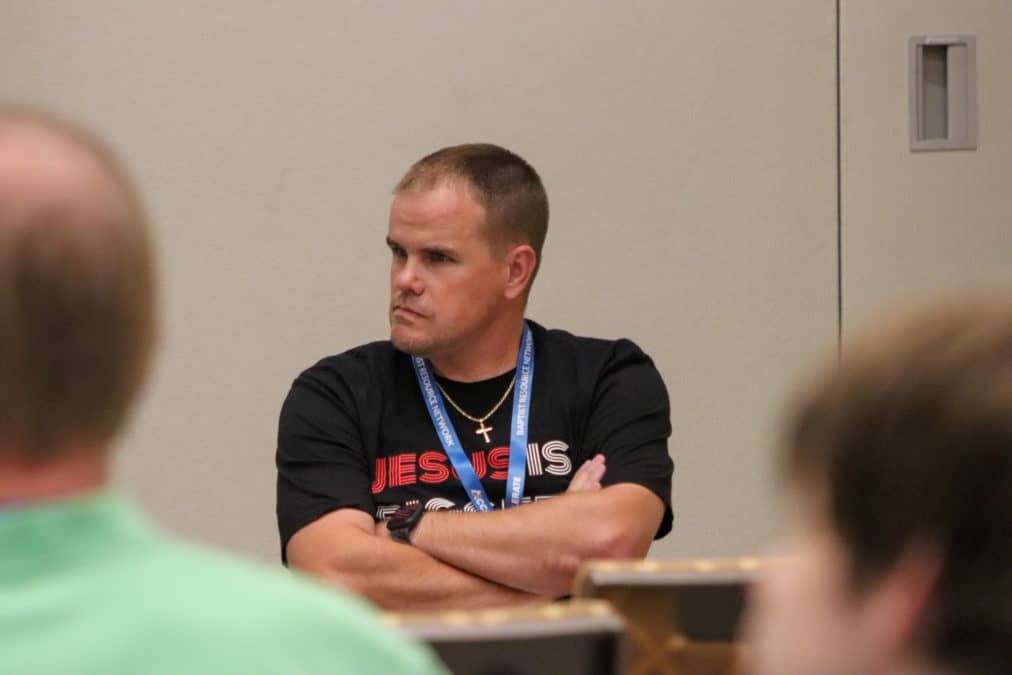HARRISBURG — During this year’s inaugural Accelerate Conference, held October 5 at the Sheraton Harrisburg Hersey Hotel, the Baptist Resource Network (BRN) unveiled #LovePASJ (Love Pennsylvania/South Jersey), a three-phase initiative that seeks to accelerate a Kingdom movement of BRN churches loving their neighbors.
To that aim, the six breakout sessions focused on how to love one’s neighbors, particularly as related to the first phase, KNOW, which seeks to help churches exegete and prayer walk their communities with the hope of engaging neighbors with the gospel. But how do you do that with neighbors who are different from you?
In his breakout session, BRN Director of Church Health, Larry Anderson, sought to answer that question. He moderated a panel discussion with four BRN pastors, asking questions regarding practical ways to communicate the gospel across cultures, generations, and genders.
The panel featured Tom Dawson, senior pastor of SOAR Church in Woodbine, N.J.; James Hogan, senior pastor of Faithbridge Community Church in McKees Rock, Pennsylvania; and Josh Crans, senior pastor of Providence Church in Coatesville, Pennsylvania.
Here is what they had to say:
1) Can you explain the diversity in your church when it comes to culture, ethnicity, generational and or gender?

Pastor Dawson: Our church started out African American and Caucasian, then we shifted our philosophy on ministry to meet all the needs of the community, which started a whole lot of other people coming. Our key focus was to meet needs that were in the community; that’s how we became multicultural. Needs have no color.
Pastor Crans: Our church was 4 1/2 years old and birthed out of what the Lord was already doing in our community. We have a multiethnic church, but we don’t have diversity for the sake of diversity; we really focus on our neighborhood. Confronted with “who is owning the spiritual condition of my neighborhood?” Crans said diversity comes naturally, but it doesn’t come easily.
Pastor Hogan: Our church was planted 16 years ago; poverty is what the people had in common; it’s a rough place, one of the worst school districts in Pennsylvania, number 1 in the FBI crime statistics in 2020; diversity of ethnicities and faith backgrounds and lack thereof, but the common denominator was poverty; inasmuch they were compelled to serve the community.
2) How did the diversity come about, meaning was it strategic intent or organic occurrence?

Pastor Hogan: We “welcome the people God sends.” “God got them to the door, your job is to love on them.” “God grows the church, not us.”
Pastor Dawson: “This is what the vision is, this is what God is telling us to do.” “It’s about the Kingdom.” “Our church is the county church” and everyone is running to us to deal with issues.
Pastor Crans: We model it from the front. We teach it; it’s an expectation that we have. It has to be intentional, though teaching and learning and reading. “You have to have intentionality before you have authenticity.”
3) How did you alter the worship experience at your fellowship in order to become welcoming to a diverse community?
Pastor Dawson: I did a radical shift; I had the mindset; I knew that we had to change to make it into the future. We transitioned to a type of worship that would meet all needs, changed the way we dressed, made the sanctuary darker so that the focus was only on worship, and made the service only one hour. My older members shifted right with it because they are all about vision, and they saw the vision meeting the needs.

Pastor Crans: We just need to teach our people what true worship is; how to worship the Lord, and I think that starts with the lifestyle, how we worship together in the body of Christ, every tribe, tongue, and nation and have the Lord be the center of it all. We try to do it in an authentic way.
Pastor Hogan: We’ve been pretty intentional about a lot of stuff about our worship; one of my favorite things is that every third Sunday, we keep the kids in the service.
4) Can you identify some push backs that you received because of your focus on diversity?
Pastor Dawson: We didn’t have a lot of people fighting the vision because I came in talking vision. A lot of it was deprogramming Philly, the way they look at themselves. That took 10 years; what helped a lot is that I developed some creative teams to figure out ways to reach out to the community. Our biggest thing is with Autism Awareness. We raised over $40,000 over the last eight years and give it to local schools. This opened the door to do other things. We gave out over 900 book bags to local schools. Last month, we created a millennial creative team to figure out ways to reach their generation.
Pastor Crans: A lot of difficulties come with a multiethnic context; this context is something that the Lord wants to see and something that I’m personally passionate about. It was worth it to endure the pain for something greater. Not everyone was ready to come back at the same time. So, we didn’t come back until everyone was ready to come back together.
Pastor Hogan: If you’re called to it, the devil’s comin’; if you’re called to it, you stick to it; if you’re called to it, and you’re in leadership, God has entrusted you as a visionary to do that. It doesn’t pay off in a minute, it pays off in sweat and toil.
5) What’s a lesson you wish you would have learned earlier about diversity?
Pastor Dawson: That I would have started it earlier. I would have gone into the community earlier.
Pastor Crans: Everybody’s at a different stage of awareness, understanding and humility. I came in thinking I was an expert on diversity, but I still have so many blind spots that I’m not aware of unless I’m with people who are different than me.